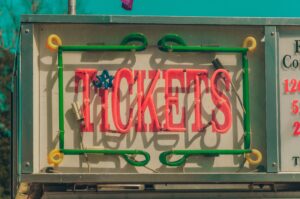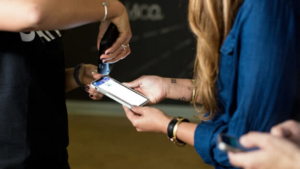You work tirelessly to create a sold-out event. Beginning months before tickets even go on sale, you’re crafting the perfect promotional strategy, nailing down venue logistics, and creating an onsite experience that that will blow attendees away. The last thing you want is for excited attendees to show up on event day with fraudulent tickets.
Every year, ticket fraud affects nearly 5 million people who buy tickets to live events. Not surprisingly, the problem is much more prevalent in the online ticketing industry — data from online ticketing merchants show that fraud rates are nearly twice as high in digital tickets than in physical tickets. This means that it’s more important now than ever to take fraud seriously. And this starts with your ticketing partner.
You’ll need a platform that you and your attendees can trust. And you’ll want a partner who balances taking fraud-prevention measures seriously while maintaining a focus on user experience to avoid losing sales.
Here’s what you can do to ensure that legitimate tickets get into the hands of deserving event-goers — without compromising the attendee experience:
1. Use Ticket Limits
Protecting your event from ticket fraud, including scalpers, begins with taking smart precautions at onsale. Cap the number of tickets available for purchase per “household” so you can ensure more tickets get in the hands of real attendees. This helps prevent scalpers from grabbing up large quantities of tickets. However, scalpers can be quite persistent, which is why Eventbrite also uses its scalping algorithms and machine learning models to monitor sales, and detect scalpers who attempt to circumvent the limits.
2. Delay Ticket Fulfillment
After a customer purchases a ticket, send them confirmation, but don’t actually provide a “print-at-home” ticket right away. Instead, provide barcodes between a week and ten days before the event. This makes it impossible for scalpers to transfer tickets far in advance — and allows your ticketing partner to confirm that all ticket buyers have adhered to the event ticket limit.
3. Include a Reselling Policy
Include language on your event listing or order confirmation explaining that tickets bought on secondary sites such as Craigslist, Gumtree, and Ebay are not guaranteed. This will help to keep attendees alert to potential scams and assure buyers that they are getting legitimate tickets. This provides a sense of security as they complete their purchase.
4. Work with a ticketing partner who takes security seriously
Ticketing companies have their work cut out for them – they must accurately detect and prevent fraud within seconds of a transaction occurring. Make sure that you choose a ticketing partner who leverages the most cutting edge technology to fight fraud.
Look for a partner who monitors every transaction in real time, so that you can stop fraud before it even occurs. And to really make sure your partner has your back, find out if they have a dedicated team of data scientists, analysts, and engineers committed to protecting you — and your customers — from fraud.
Curious about how this looks in action? Read about how Newport Folk Festival reduced scalping and ticket fraud. They teamed up with Eventbrite to go above and beyond the standard measures by scrutinizing IP addresses, billing addresses, and other clues that scalpers left behind. These fraud detection mechanisms stopped an additional 10% of tickets from going to professional resellers and got tickets back into the hands of legitimate buyers.





